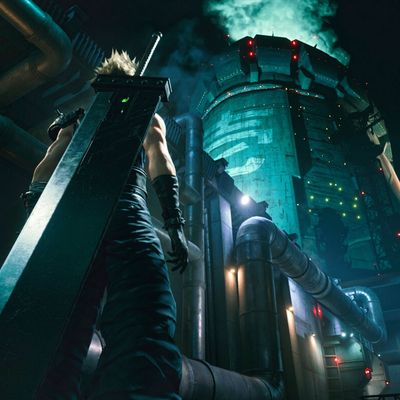
Corporations bleed the planet of vital resources on the orders of heads of state either too blind to the cost of their meddling to change or too old to care. Mining fuels grisly industry, feeds factories manufacturing machines of war. Military conflict rages. New initiatives require new fuel; new fuel requires new drill sites. Expansion is a must. The spoils of war are showered on the rich. The dregs trickle down on the poor. It is never enough. The people can only take so much. The planet can only give so much. Who breaks first?
In 1997, the plot to Final Fantasy VII seemed far-fetched, a cautionary cyberpunk parable and ideological descendant of famed anime artist and director Katsuhiro Otomo’s dystopic metropolitan nightmare Akira, and a peer to contemporary properties like Neon Genesis Evangelion, another yarn about a futuristic city on the brink of annihilation. You had to go long in that company. Final Fantasy VII gave series creator Hironobu Sakaguchi a chance to move his flagship nonlinear role-playing saga out of the castles, towns, and dungeons of its early days, pushing the steampunk and industrial themes in Chrono Trigger and FF6 to their logical conclusion. Square — developer and publisher of the Chrono and Final Fantasy games as well as beloved franchises like Kingdom Hearts and Secret of Mana — saw a chance to make use of real-world advances in tech as Nintendo, and later Sony, led the charge toward true 3-D in gaming.
The story of Cloud Strife — a merc for hire who stumbles into a plot to stop the corporatocratic city-state of Midgar from harnessing “mako” (crude oil with a little spiritual razzle-dazzle, to keep it short) in order to take over the planet — is a philosophical paradox, a tale about the dangers of new tech that made a mint on said tech. Midgar imagined what might happen if humanity industrialized too hard, if a dictator ran wild with frightening new toys. The message was heavy-handed. Midgar’s a walled city where the upper class lives on a plate propped up on top of everyone else. The slums languish in perpetual darkness, literally in the shadow of the suits and scientists running the nefarious Shinra corporation. Powerful soldiers exhibit unnatural talents. Propaganda handles what brute force doesn’t.
Revisiting Midgar in the new Final Fantasy VII Remake in a bad stretch of days for Earth Prime invites the question of whether what happened there can happen here. The answer’s much clearer now amid callous leadership and technological progress. Misinformation divides people and halts progress. The lie that told us connectivity cures hate has been debunked. Remake, the opening salvo in a sprawling project aimed at giving FF7 a gorgeous modern makeover, stretches the original game’s five-hour Midgar act into an adventure spanning 30 to 40 hours. The city is alive now in ways the blocky polygonal figures and fixed backgrounds of the ’97 version lacked the juice to display. There’s greater depth in the world-building and new and enticing tidbits both large and small. The music, given a new sheen by longtime FF composer Nobuo Uematsu along with FF13 regulars Masashi Hamauzu and Mitsuto Suzuki, hints at a wide world beyond Midgar’s walls, pulling from trap, rock, jazz, reggae, and country to spice up familiar melodies. The visuals are frequently jaw-dropping.
More time to explore the city means more time to develop the personalities that occupy the space. (Also, it means bigger boss fights and longer dungeons, which can ramp up difficulty delightfully, or, in the case of the stretch in which you travel through a murky sewer into a haunted train graveyard, it can pad the game with too many cloying puzzles.) Residents talk and gossip among themselves. Your friends get deeper, often heartbreaking backstories. It’s illuminating learning what motivates Avalanche, the ecoterrorist cell that recruits Cloud for muscle during a mission to blow up Midgar’s mako reactors, reducing the city’s environmental footprint in the most blunt means available. Desperate choices drive the team, but now you get to hear from neighbors rightly terrified by its actions. This adds new dimensions. Shinra grasps science as a means of production and consolidating power, but it can’t grok consequences or stewardship. This negligence touches everyone. Avalanche’s scorched-earth activism does too. There aren’t neatly defined good and bad guys in FF7, just good and bad ideas on how to navigate the future.
(That’s also the story of 2020. There are people trying to make things better for everyone, and there are people trying to make things better for themselves at the expense of everyone else’s well-being. Shinra doesn’t seem as cartoonish in this light. The question here isn’t whether or not FF7 could happen to us but, rather, how much of it already has.)
Over 20 hours into Remake, I’m appreciating Midgar, a portion of the original game I used to speedrun in one sitting to escape. The story of the street is people trying to make it through the day. I catch myself looking over expanses of junk and ramshackle structures, lingering around non-playable characters to hear what they make of the day’s news. I used to relate to Cloud, the disaffected asshole unafraid to tell you where he’d rather be than standing next to you. Now, I think he plays that role to keep people from getting too close, to keep himself from getting hurt. My new faves are the people of the slums. I respect the orphanage kids patrolling their neighborhood armed with wooden swords. I relate to jaded, quick-tongued shopkeepers and despondent drunks lurking the strip of bars and brothels in Wall Market. I suspect if they were real, we’d all wake up mulling over the same thought: Everything’s fucked. What do we do now?


